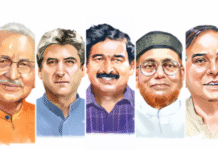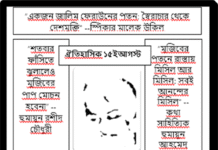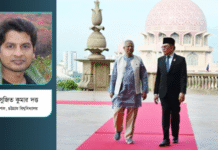Next population census to be held in 2021 could be the last one in Bangladesh, the outgoing UNFPA representative Arthur Erken has said as he has found that the country is becoming ‘increasingly’ urbanised and ‘it is difficult to get reliable counts’ in crowded cities.
In an interview to bdnews24.com he suggested strengthening of birth and death registration system to get actual counts for formulating policies and planning.
After a six-year mission in Bangladesh, the UN official is leaving Dhaka this month. During his stay, he was witnessed to a controversy over the initial finding of the 2011 census conducted by the Bangladesh Bureau of Statistics. Some ministers were sceptical about the census figures.

Referring to that Erken said controversy over census was not a Bangladesh-specific trend. “Even in US census generates huge political controversy as a census report is always politically important”.
“I do think conducting census in Bangladesh will become more difficult in future because there will be more urban people and conducting a census in urban areas anywhere is difficult,” he said.
He pointed out that in cities sometimes people even refused to open the doors, “We often hear that security guards prevented enumerators to enter buildings”.
Citing the scenario in his own country, Holland Erkan said there from birth to school admission to marriage “everything is being registered”.
“I have to register myself with the local municipality the moment I move in to live within its jurisdiction. And then it is forwarded to the central bureau of statistics like BBS.”
For instance, he said, “if you go to Khulna, you have to report to the local municipality and the record will automatically go to the central authority”.
He said the BBS was also aware of the future challenges in holding census.
“If they do one in 2021, it will probably be the last one. I do not see it happening anymore in 2031,” the UN representative said.
BBS conducts census 10 years apart.
The last census triggered controversy as top political leaders like agriculture minister Matia Chowdhury raised doubt about the preliminary population figure of 142.319 million.
The preliminary result, released in July 2011, showed Bangladesh’s total population as 142.319 million, as on Mar 15.
The final result was released after adjusting the figure.
Since many raised questions about the competence of BBS to hold the census, the Bangladesh Institute of Development Studies (BIDS) was assigned, for the first time, for the post-enumeration check.
But even after its post-census verification, population scientists raised questions as it showed almost equal numbers of people were left out during the count in city corporation areas as well as in the rural areas.
Erken, however, said the 2011 census was ‘the best one’ that Bangladesh ever had.
“There was no international controversy. Even ESCAP took it as a model,” he said and that the controversy had been generated as there was a perception that Bangladesh’s population was about 160 million.
He said during the last census “if the BBS was influenced by the politicians then it would not have presented the initial figure of 142 million”.
“They knew people wanted to hear the country has a population of 160 million. So, if it was influenced, it would have put the figure during the first enumeration at around 150 million to reach 160 million after post-enumeration adjustment”.
The final count showed it was more than 148 million.
He said as there was controversies earlier, BBS this time did not do the post-census check.
“In order to show that it (BBS) was not involved in the process it assigned the task to an independent body, BIDS,” he said, “no country outsource it to a separate organisation”.
“It’s weird, but it did that considering the controversies and possible dent on its image,” he said.
Though he termed the last census ‘best’, he said census could be manipulated.

“You and me have no way to prove,” he said, “to me when they presented the 142 million figure initially, I knew they were right because that is roughly the figure though it did not fit in lot of other agenda like general perceptions of 160 million”.
Erken said Bangladesh was ‘the best’ place for him to work as an UN official as UN has an involvement in everything from maternal issues to reproductive health in Bangladesh.
“And it’s being deal by the government and people,” he said extolling Bangladesh’s progress in cutting maternal as well as infant mortality.
He, however, said the issue of child marriage still remained a challenge in Bangladesh with almost half of the girls are being married off within 16 years of age.
Source: bd news24









